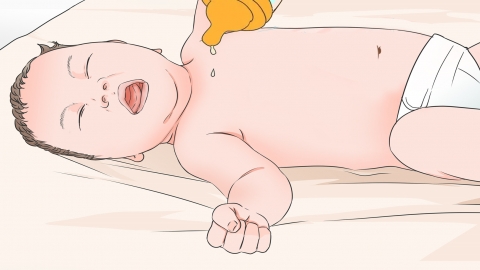What should I do if a 7-month-old baby has a fever of 38°C?
Generally speaking, fever refers to elevated body temperature. A 7-month-old baby having a fever of 38°C might be caused by high environmental temperature, increased heat production after physical activity, infantile emergency rash, upper respiratory tract infection, or bronchitis. Treatment options, such as general care or medication, can be adopted under a doctor's guidance. If the baby doesn't recover promptly, you should seek immediate medical attention. Detailed analysis is as follows:

1. High Environmental Temperature
A 7-month-old baby's thermoregulatory capacity is still relatively weak, and their surface heat dissipation function is not fully developed. When exposed to a high-temperature environment, the baby's body may struggle to maintain thermal balance through normal heat dissipation mechanisms, leading to heat accumulation and an increase in body temperature up to 38°C. Parents should ensure a suitable indoor temperature and adequate ventilation to prevent abnormal body temperature caused by environmental factors.
2. Increased Heat Production After Physical Activity
When a baby engages in vigorous activity, such as frequent rolling over or prolonged crawling and playing, the muscular activity can generate significant heat. Due to underdeveloped sweat glands and limited perspiration capacity, the baby may not effectively dissipate excess body heat, temporarily elevating the body temperature to 38°C. It's important to appropriately manage the duration and intensity of the baby's activities. After physical activity, loosen the baby’s clothing slightly, wipe the forehead, neck, and armpits with a warm towel, allow the baby to rest, and provide adequate hydration.
3. Infantile Emergency Rash (Exanthem Subitum)
Infantile emergency rash is primarily caused by human herpesvirus 6 infection, with some cases attributed to human herpesvirus 7. Viral infection can trigger an immune response in the body, leading to fever. The baby may also show mild irritability and reduced appetite. This condition is generally self-limiting. Under a doctor's guidance, medications such as paracetamol oral solution, ibuprofen suspension drops, or Pudi Lan Xiao Yan oral liquid may be used for treatment.
4. Upper Respiratory Tract Infection
An upper respiratory tract infection is usually caused by viral or bacterial infection. After invading the respiratory tract, the pathogen multiplies on the mucous membranes and releases toxins, stimulating the immune system and causing fever. Symptoms often include nasal congestion, runny nose, and sneezing. It is recommended to use medications such as ibuprofen syrup, cefaclor dry suspension, or amoxicillin granules under medical supervision to alleviate symptoms.
5. Bronchitis
Bronchitis is commonly caused by viral, bacterial, or mycoplasma infection. After infecting the bronchial mucosa, the pathogen triggers a local inflammatory response, leading to the aforementioned symptoms. The baby may also experience coughing, wheezing, and shortness of breath. Treatment may include medications such as cefixime dry suspension, ambroxol oral solution, or acetylcysteine granules, as directed by a physician.
It is recommended that caregivers wash their hands before handling the baby to prevent the transmission of pathogens. The baby's daily items, such as bottles and toys, should be regularly cleaned and disinfected to reduce the risk of infection.




